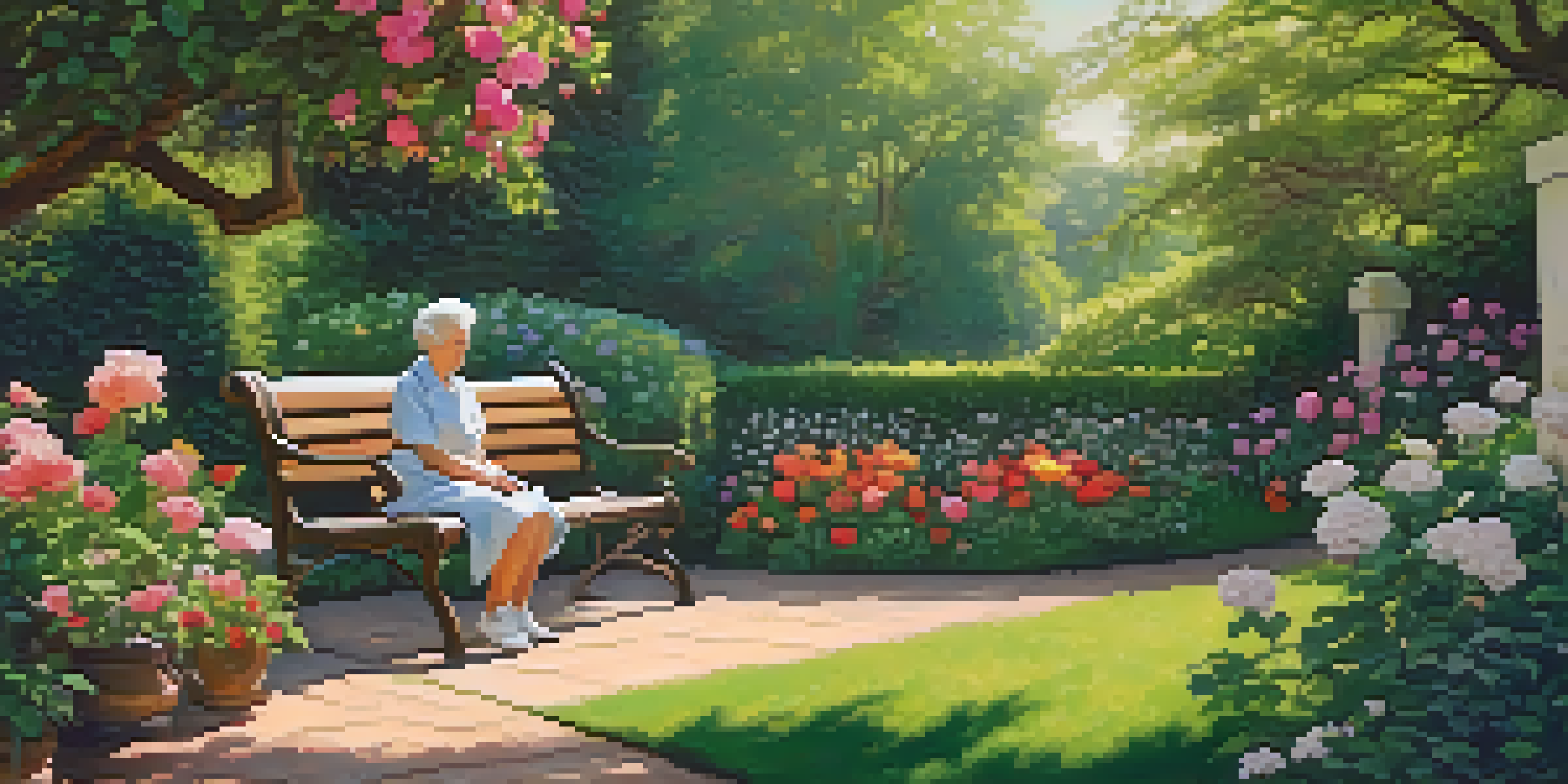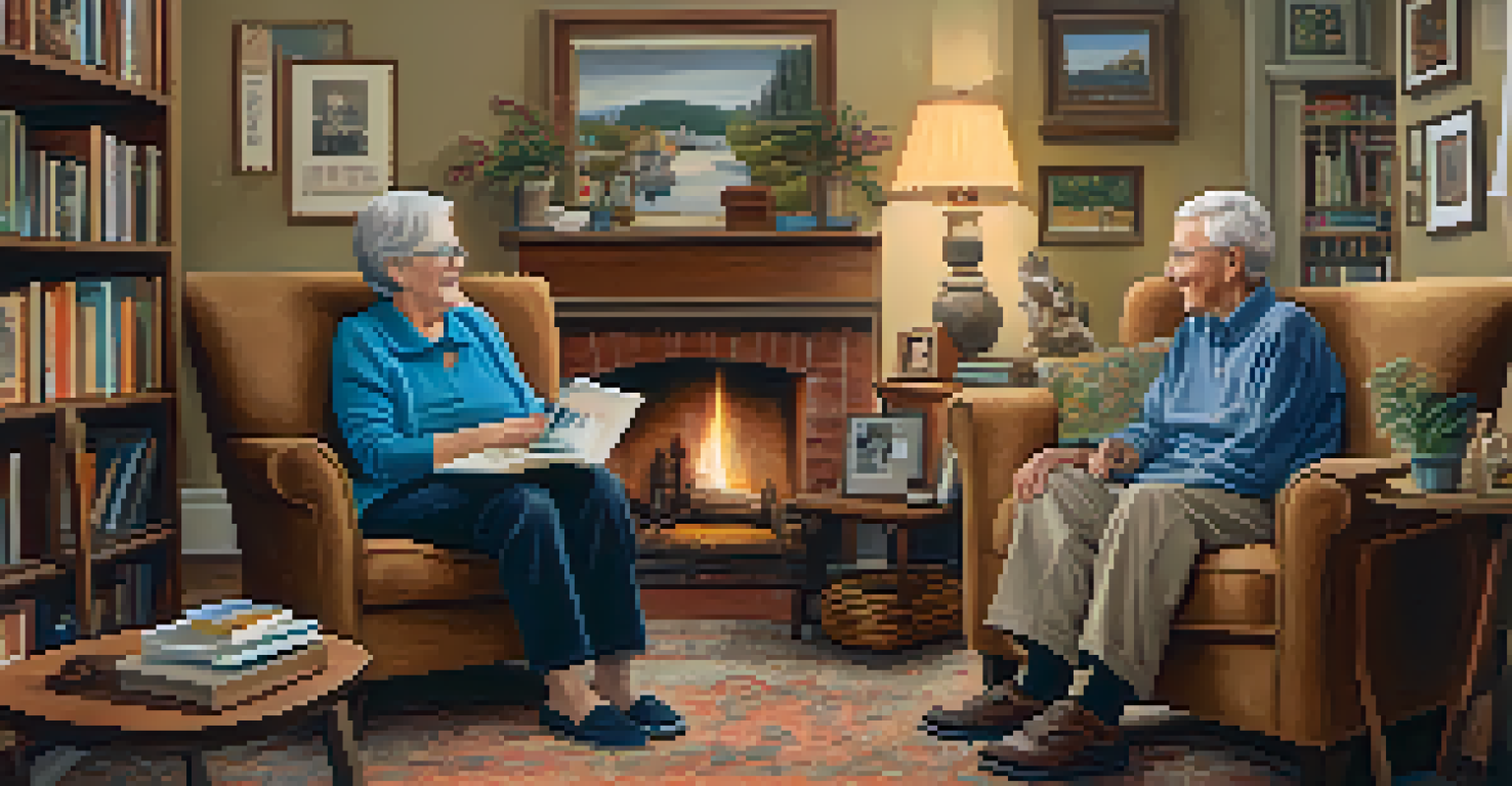Hallucinogens and Their Influence on Elderly Mental Health

Understanding Hallucinogens: What Are They?
Hallucinogens are substances that alter perception, mood, and cognitive processes. Common examples include LSD, psilocybin (magic mushrooms), and mescaline. These substances can lead to vivid hallucinations and changes in sensory perception, which can be both fascinating and overwhelming. Their effects can vary greatly depending on the dose, the individual, and the setting in which they are consumed.
Psychedelics may offer unique therapeutic advantages for older adults.
While often associated with the younger generations, interest in hallucinogens has surged among older adults. This resurgence is partly due to growing research into their potential therapeutic benefits, particularly in treating mental health issues like depression and anxiety. Many elderly individuals are seeking alternative treatments for age-related mental health challenges, and hallucinogens are entering the conversation.
However, it's essential to approach the topic with caution. The elderly population may have unique health considerations, such as pre-existing conditions and medication interactions, that could complicate the use of hallucinogens. Understanding both the potential benefits and risks is crucial for informed discussions.
The Mental Health Landscape for the Elderly
Mental health issues among the elderly are alarmingly prevalent, with many facing conditions like depression, anxiety, and cognitive decline. These challenges can stem from various factors, including isolation, chronic illness, and the loss of loved ones. As traditional treatments may not always yield desired results, there's a growing need for innovative solutions.

Research indicates that psychedelics may offer unique therapeutic advantages for older adults. For instance, studies have shown that substances like psilocybin can help reduce symptoms of anxiety and depression, particularly in terminally ill patients. This potential opens up new avenues for improving the quality of life for seniors who feel trapped by their mental health struggles.
Hallucinogens Aid Elderly Mental Health
Research suggests that hallucinogens may offer therapeutic benefits for older adults dealing with depression and anxiety.
Moreover, the effects of hallucinogens can lead to profound personal insights and emotional breakthroughs. Many users report experiencing a sense of connectedness, not just to themselves but to others and the universe, which can alleviate feelings of loneliness and despair that often accompany aging. This shift in perspective can be life-changing.
Potential Benefits of Hallucinogens for Seniors
One of the most exciting aspects of hallucinogens is their potential to foster a sense of well-being. For elderly individuals grappling with depression or anxiety, psychedelics might provide an opportunity to experience joy and peace. Anecdotal evidence suggests that these substances can enhance emotional resilience, helping seniors better cope with the challenges of aging.
These substances could become a viable option for enhancing mental health among seniors.
Additionally, hallucinogens have shown promise in promoting neuroplasticity—the brain's ability to adapt and form new connections. This is particularly relevant for older adults, as cognitive decline can hinder their ability to learn and remember. By stimulating neuroplasticity, hallucinogens may help keep the brain more agile and engaged.
It's also worth noting that the therapeutic use of hallucinogens can encourage introspection and self-reflection. Many participants in studies have reported significant shifts in their life perspective, leading to improved mood and emotional health. This aspect can be particularly beneficial for seniors who feel stuck in negative thought patterns.
Risks and Considerations for Elderly Users
Despite their potential benefits, hallucinogens come with risks that shouldn't be overlooked, especially for the elderly. Older adults are often on multiple medications, and the interaction between these drugs and psychedelics can lead to adverse effects. Therefore, a thorough medical evaluation is essential before considering their use.
Furthermore, the psychological effects of hallucinogens can be unpredictable. While many individuals have positive experiences, others may face anxiety, paranoia, or distressing hallucinations. For seniors with pre-existing mental health conditions, the risk of exacerbating these issues can be significant. It's crucial to ensure a safe and supportive environment for anyone looking to explore these substances.
Risks Require Caution for Seniors
Elderly users must consider potential medication interactions and unpredictable psychological effects before using hallucinogens.
Lastly, there is still a societal stigma surrounding hallucinogens that can affect elderly users. Many seniors grew up in an era when drug use was heavily demonized, making it challenging for them to embrace these substances even if they might benefit from them. Open dialogues about their potential and risks can help mitigate this stigma.
Current Research on Hallucinogens and Aging
Research into the effects of hallucinogens on elderly mental health is still in its infancy, but the early findings are promising. Studies are exploring the safety and efficacy of psychedelics in treating a range of mental health issues, including depression, anxiety, and PTSD. This research is crucial for understanding how these substances can be integrated into geriatric care.
Institutions like Johns Hopkins University have been at the forefront of this research, conducting clinical trials that include older adults. These studies aim to determine optimal dosages and therapeutic settings, ensuring that elderly users receive the maximum benefit with minimal risk. As the body of evidence grows, it may lead to more widespread acceptance and use of these substances in clinical settings.
Moreover, ongoing research will help clarify the long-term effects of hallucinogens on cognitive function and mental health in seniors. While some anecdotal reports speak positively about the experiences, robust scientific data is needed to guide practitioners and patients alike. As we learn more, we can better navigate the complex landscape of aging and mental health.
Personal Stories: Seniors Embracing Hallucinogens
Personal accounts from elderly individuals who have experimented with hallucinogens provide valuable insights into their impact. Many seniors share transformative experiences, describing how psychedelics helped them confront unresolved grief or rekindle their passion for life. These stories highlight the potential for hallucinogens to facilitate healing and personal growth, even in later years.
For instance, one elderly woman recounted her journey with psilocybin, stating it allowed her to process the loss of her spouse in a profound way. Through her experience, she found clarity and peace, enabling her to embrace life with renewed vigor. Such testimonials can inspire others to consider alternative therapies for mental health support.
Growing Research on Psychedelics
Ongoing studies are exploring the safety and efficacy of psychedelics in treating mental health issues among the elderly.
However, these stories also underline the importance of a supportive community and proper guidance. Many seniors emphasize the positive impact of sharing their experiences with trusted friends or therapists. This sense of community can provide reassurance and understanding as they navigate the complexities of using hallucinogens.
The Future of Hallucinogens in Elderly Care
As research continues to evolve, the future of hallucinogens in elderly care looks promising. With growing acceptance and understanding, these substances could become a viable option for enhancing mental health among seniors. The challenge lies in ensuring safety, accessibility, and informed decision-making for those considering their use.
Moreover, the integration of hallucinogens into therapeutic practices will require collaboration between healthcare providers and researchers. Developing guidelines and protocols will be crucial to navigating potential risks while maximizing benefits. This collaborative approach can help create a supportive environment for elderly patients exploring these options.

Ultimately, as society begins to shift its perspective on hallucinogens, we may witness a broader acceptance of their role in mental health treatment. The potential for these substances to positively impact the lives of elderly individuals is an exciting frontier in mental health care, one that warrants careful exploration and understanding.